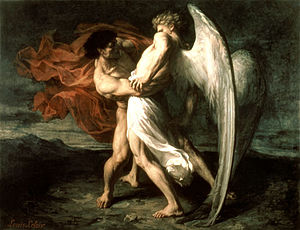
Looking beyond the books of the Bible and into other ancient Jewish writings containing some very different views of biblical heroes can be a most interesting experience.
Have a look at The Prayer of Joseph (1st or 2nd century CE):
[1] “I, Jacob, who is speaking to you, am also Israel, an angel of God and a ruling spirit.
[2] Abraham and Isaac were created before any work.
[3] But, I, Jacob, who men call Jacob but whose name is Israel am he who God called Israel which means, a man seeing God, because I am the firstborn of every living thing to whom God gives life.
[4] And when I was coming up from Syrian Mesopotamia, Unel, the angel of God, came forth and said that I had descended to earth and I had tabernacled among men and that I had been called by the name of Jacob.
[5] He envied me and fought with me and wrestled with me saying that his name and the name that is before every angel was to be above mine.
[6] I told him his name and what rank he held among the sons of God.
[7] ‘Are you not Uriel, the eighth after me? and I, Israel, the archangel of the Power of the Lord and the chief captain among the sons of God?
[8] Am I not Israel, the first minister before the face of God?‘
[9] And I called upon my God by the Inextinguishable Name.”
Even Moses appears to have had a pre-existence in heaven before he appeared on earth to deliver the Israelites from Egypt: I quote from “Imitatio Mosis: Patterns of Cosmology and Soteriology in the Hellenistic Synagogue” (Studia Philonica, 1972, 27-55)
In the treatise on the sacrifices Philo discusses the ascension of Moses and his superior station beside God as the perfect man, the sophos whom God prizes as he does the world. Then he continues:
And even when He sent him as a loan to the earthly sphere and suffered him to dwell therein, He gifted him with no ordinary excellence, such as that which kings and rulers have . . . but he appointed him as god . . . ‘I give thee,’ He says, ‘as god to Pharaoh’ (Exod 7:1 ); but God is not susceptible of addition or diminution, being fully and unchangeably himself. And therefore we are told that no man knows his grave (Deut 34:6). For who has powers such that he could perceive the passing of a perfect soul to Him that is?
The statement that Moses was sent to the earthly sphere is most interesting in light of the fact that for Philo, with two notable exceptions, the things which descend from God are usually not thought of as anthropological figures, but as powers, gifts, or virtues of God. The notable exceptions are the logos and some difficult statements about the sophos who sojourns on earth while dwelling in heaven. One can hardly escape the inference that the descensus Mosis reflects a logos motif and that the cosmic destiny of the logos has become a pattern according to which the figure of Moses is understood. It is important to note that this is not the only passage in Philo which speaks of Moses’ descent. 81
Endnote #81 — unfortunately the Greek text did not copy and I have only approximated it in square brackets:
. . . . One should compare Ebr 100 where Moses is identified with the sophos – a pilgrim who travels from peace to war, and from the camp of mortality and confusion to the divine life of peace where strife is not. Since the metaphors of peace and war refer in Philo to the two spheres of existence (worlds), it is significant that the movement of ascent is prefaced by that of descent. In Heres 205-06 Philo describes the logos,”God’s messenger” and “harbinger of peace to creation from that God whose will it is to bring wars to an end.” This logos has received from the Father of all the prerogative to stand on the border and separate the creature from the creator, pleading with the immortal as suppliant for afflicted mortality and acting as ambassador of the ruler to the subject. The passage is an interpretation of Deut 5:5 – Moses’ statement that “I stood between the Lord and you!” According to Conf 106 Moses is [asteios apo geuesews arches] which could simply be a [theios aner] motif. But the description continues that he “took the world for his township and country, and weeps bitterly in days when he is imprisoned in the ark of the body . . . weeps for his captivity . . . weeps also for the mind of the multitude.” The passage can hardly be understood otherwise than as a reference to descensus. In another context, that of the Sinai story, Philo dramatizes the moment when Moses learns that the people have fashioned a golden calf: “This divine message came. ‘Go quickly hence. Descend. The people have run after lawlessness'” (Vita Mos II 165). One is also justified in asking whether numerous other references to the “sending” “coming” or “appearing” of other figures [sophos, dunamis, theos, logos) in contexts not governed by explicit reference to Moses may not indeed have him in mind.
If you enjoyed this post, please consider donating to Vridar. Thanks!

Ah the name above all others is…
Shhh…. I did not highlight that bit. It’s a secret.